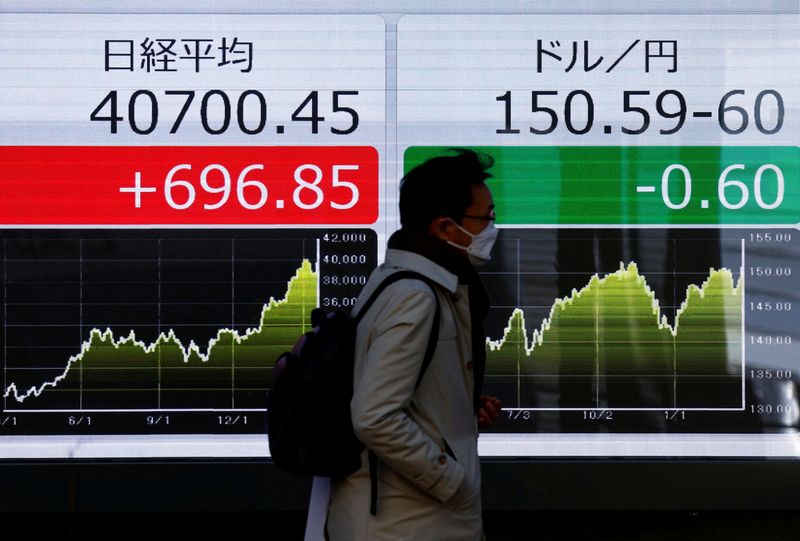By Jamie McGeever
(Reuters) - A look at the day ahead in Asian markets.
Asian markets on Monday aim to kick off a week jam-packed with top-tier local economic indicators and policy decisions in optimistic mood, after another set of forecast-busting U.S. job growth figures sparked a sharp rise on Wall Street on Friday.
The highlights on Monday's Asian calendar are trade and current account figures from Japan, industrial production from Malaysia, and an interest rate decision in the Philippines.
Japan's Nikkei 225 will be looking to bounce back from Friday's 2% slide, which sealed a weekly loss of 3.4%, its biggest decline since December 2022. As ever, the exchange rate and threat of yen-supportive intervention from Tokyo will hold great sway over Japanese stocks.
The rebound in risk appetite in U.S. trading on Friday was noteworthy as it came despite a spike in bond yields, a 4% weekly rise in oil prices to just under $92 a barrel, and a further erosion of U.S. rate cut expectations.
Geopolitical tensions continue to bubble away too, pushing gold to a record high of $2,330 an ounce on Friday.
Will Wall Street's feel good factor extend into Asia on Monday, or will markets feel the squeeze? The signs point to equities in a period of consolidation at the highs rather than a profit-taking run for the hills.
The S&P 500 and MSCI World indexes registered their biggest weekly losses in three months in the face of rising bond yields, but they were less than 0.8%. The MSCI Asia ex-Japan index, which is sensitive to higher U.S. yields, was even more resilient, basically ending the week flat.
Much of that resilience is down to improving economic numbers from China, and Beijing releases a batch of key indicators this week including lending, trade and inflation.
U.S. Treasury Secretary Janet Yellen has just completed a four-day visit to China. Yellen said that she and Chinese Vice Premier He Lifeng agreed to launch exchanges on "balanced" economic growth, an effort to address U.S. concerns about China's excess manufacturing capacity.
She also told Premier Li Qiang that bilateral relations were now more stable because the two sides can have "tough" discussions.
The Philippine central bank, meanwhile, is widely expected to keep its key policy rate on hold at 6.50% for a fourth meeting on Monday. Inflation picked up for the first time in five months in February, rising to 3.4%, and the central bank cautioned risks to the outlook remained toward the upside.
That suggests the Bangko Sentral ng Pilipinas (BSP) may be less inclined to reduce its rate ahead of major peers, notably the Fed. Seven out of 19 economists in a Reuters poll predict a 25 basis points cut to 6.25% either in May or June.
Here are key developments that could provide more direction to markets on Monday:
- Philippines central bank policy meeting

- Japan trade, current account (February)
- Malaysia industrial production (February)
(By Jamie McGeever; Editing by Bill Berkrot)